We’re proud to serve over 7 million customers across the UK. Those customers come from many different backgrounds, and so we need a team who represent the same kind of diversity to best understand and solve their problems.
Since our last update in 2021, we've grown from 2,100 to 2,450 employees. We continue to foster a culture of trust amongst our staff, and the proportion of Monzo employees that voluntarily share their diversity data with us has climbed by 7ppt to 83.0%.
Representation of women has improved among our technical leadership roles (up by 7.3ppt to 22.5%), our board (where it rose by 12.0ppt to 56.0%), and in our overall leadership roles, like Directors and VPs (up by 0.6ppt to 35.6%). We also made improvements to our family and wellbeing benefits that support our women (and all staff), including 6 months full pay for primary caregivers and access to fertility and reproductive health support.
But we also saw our gender pay gap increase from 4.3% in April 2021 to 9.3% in April 2022 as we grew our tech team (roles which tend to be higher paid) and overall hired more men than women into these roles.
22.9% of our leadership are now People of Colour, meaning we met our company-wide goal to grow representation at the senior levels of Monzo. Our Black and Mixed Black representation is also growing (up 1.4ppt to 6.3%) and the community's very active. We've grown our Mutual Mentoring programme, which pairs community members with leaders to explore race equality. The community also came together to host a strategy day to co-create a mission to develop and engage our Black and Mixed Black staff.
Where we need to do more is growing Black and Mixed Black representation among leadership, and we have a specific company-wide goal to have at least 4% representation of Black and Mixed Black staff in leadership positions by September 2023.
We’ve increased the representation of women in technical roles (from 22.7% to 26.5%) and technical leadership roles (from 15.2% to 22.5%)
Since 2022, we’ve refined our tech team to include all the folks who have roles in Product and Design teams as well as our Engineering and Data teams. We’ve also removed any non-tech operational roles from this group.
From 2021 to 2022, representation of women in technical roles has risen from 22.7% to 26.5%
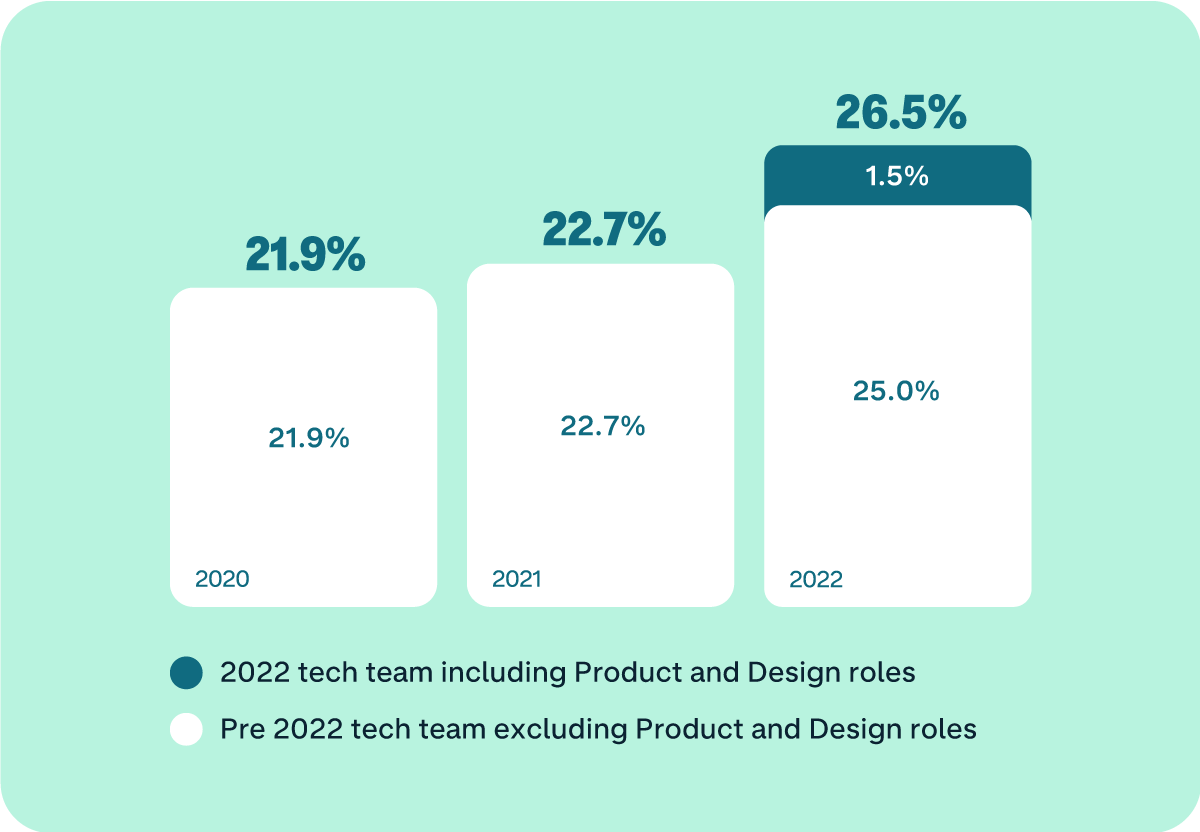
From 2021 to 2022, representation of women in technical leadership roles has risen from 15.2% to 22.5%
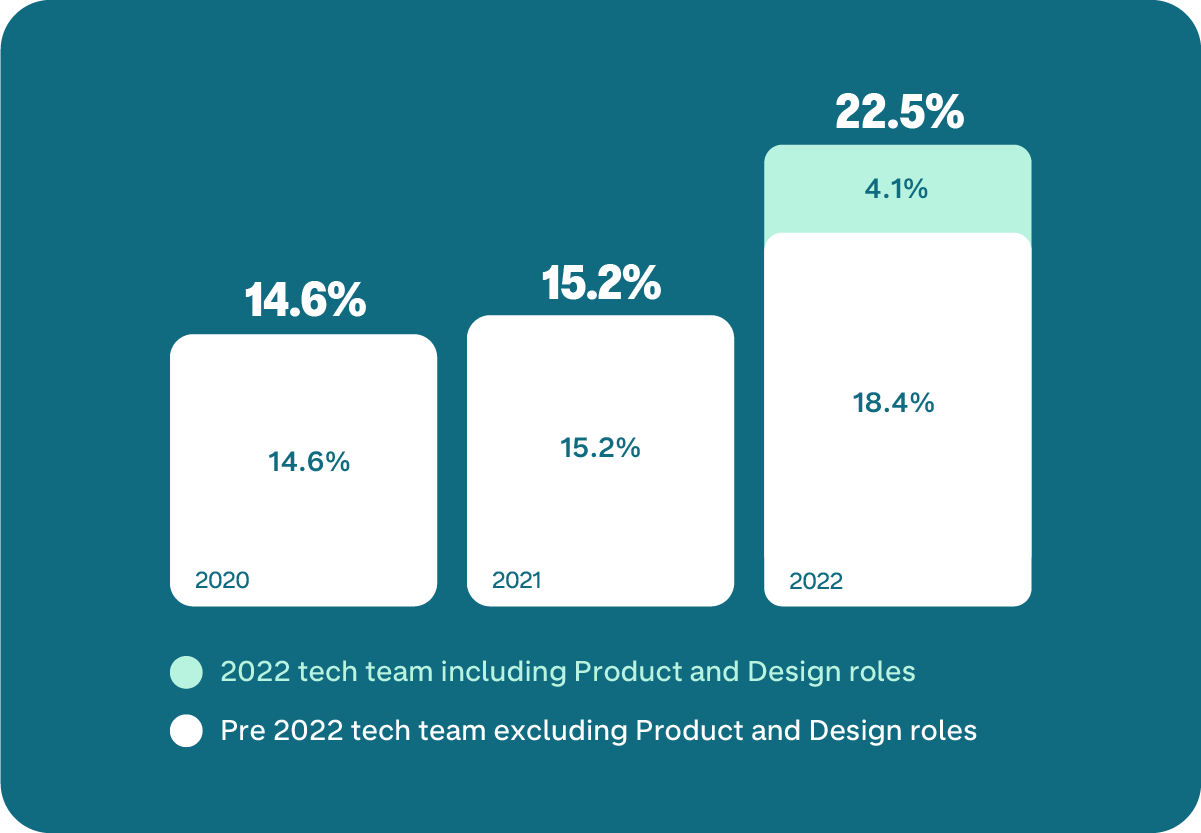
In the wider tech industry, salaries for tech roles are generally higher. With 200 new hires in the last year, we grew our tech team by 50%. 30% of these new joiners are women (which is in line with the gender mix in the industry), but overall we hired more men than women. And that’s had a negative impact on our company gender pay gap.
From 2021 to 2022, our gender pay gap has widened from 4.3% to 9.3%
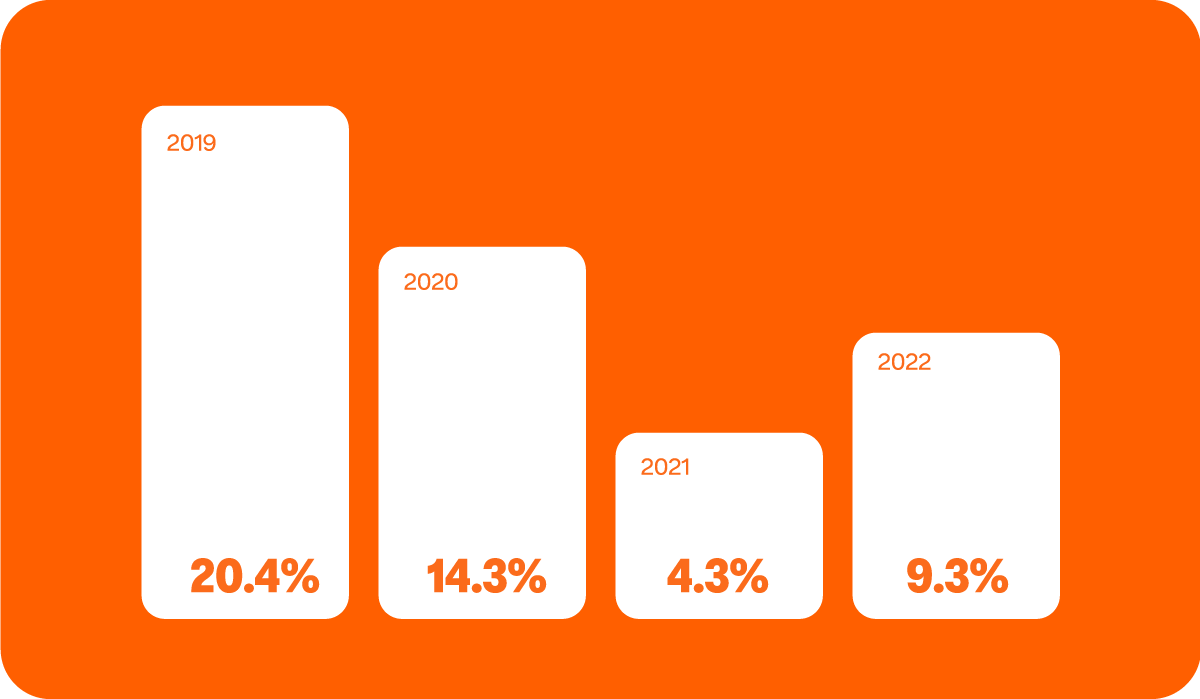
Representation of women in technical leadership roles has increased by 7.3ppt to 22.5%. But we still need to work on this to meet our company-wide target of 40% women in leadership positions (currently at 35.6%) and close our gender pay gap.
We’ve also improved the representation of women in our wider tech team through a series of actions, like actively sourcing candidates for technical roles rather than just advertising them on our website. This means we can reach out directly to a range of candidates, rather than relying on open job postings which often result in a less diverse applicant pool.
We’ve partnered with the Women in Tech Forum, Women in Data Science and Coding Black Females to help attract more women into our tech teams. These partnerships give us a chance to showcase our talented women at Monzo through speaking and mentoring opportunities. This helps demystify working in tech and encourages other women to consider joining.
We held listening sessions with our women engineers where we discussed how we can improve their experience at work through actions like clear career paths, mentoring and personal development. One of the outcomes was to pilot one-on-one growth conversations between our women in tech and senior tech leadership to develop joint, concise career plans that will complement manager support. We’re rolling out these forums to all technology teams to make sure that any changes meet the unique needs of each group.
As well as focusing on our tech teams we focus on the most senior roles in Monzo. For example, our Board Diversity Policy sets out the commitment and approach to diversity of the board of directors and includes goals for representation of women and People of Colour. Women make up 56% of our Board, with 83% of Non-Executive Directors being women. During the time period covered by this report, we saw a dip in our Executive Committee from 44% to 25%. But in 2023 this has already grown to 33% and we'll continue to do more with the support of a new dedicated executive hiring lead.
We’ve increased the representation of People of Colour in Leadership roles (from 21.7% to 22.9%) and the overall representation of Black & Mixed-Black staff (from 4.9% to 6.3%)
From 2021 to 2022, representation of People of Colour in Leadership roles has risen from 21.7% to 22.9% and for Black and Mixed Black staff from 2.0% to 2.2%
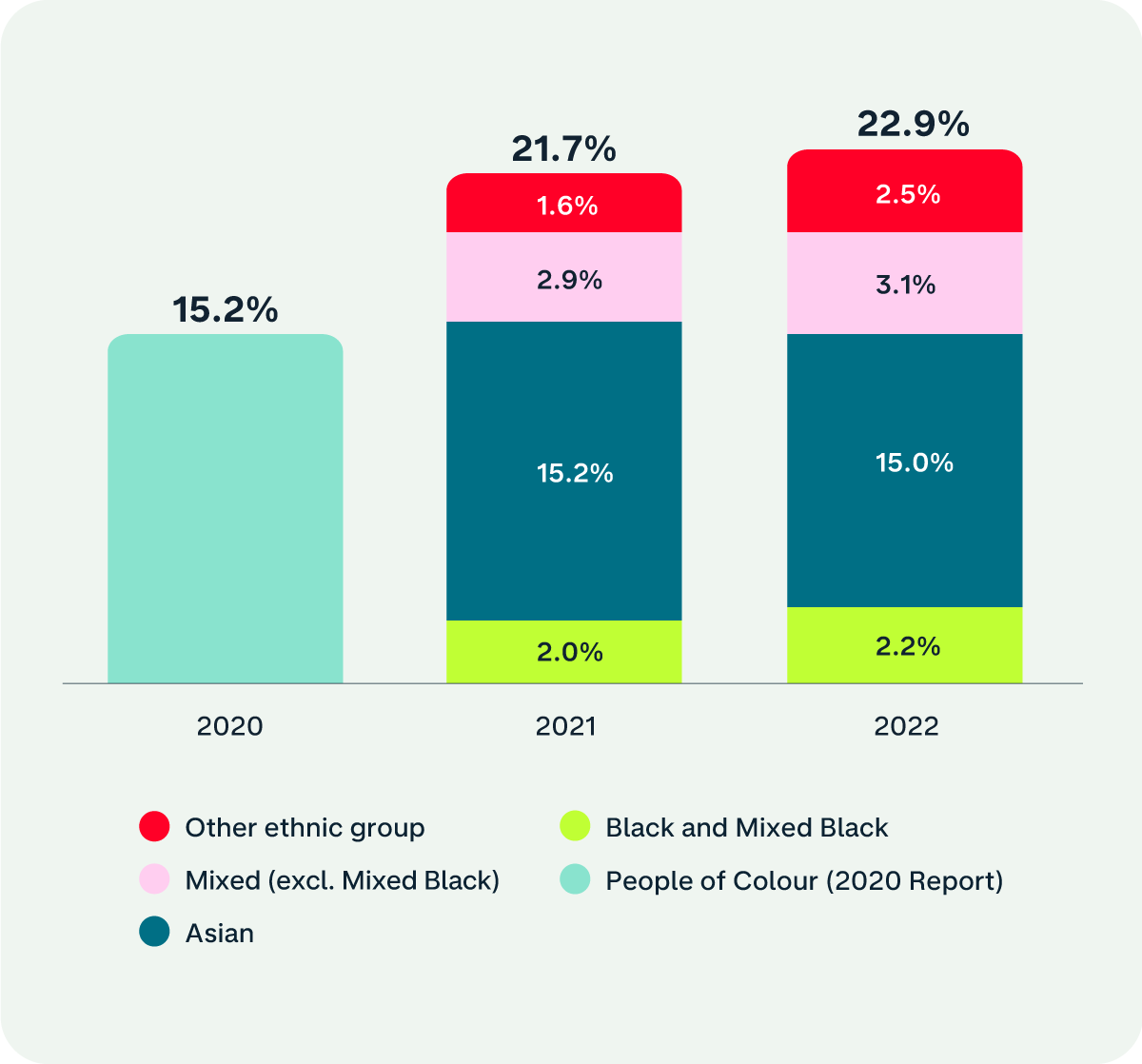
From 2021 to 2022, representation of People of Colour in all roles has risen from 21.6% to 23.1% and for Black and Mixed Black staff from 4.9% to 6.3%
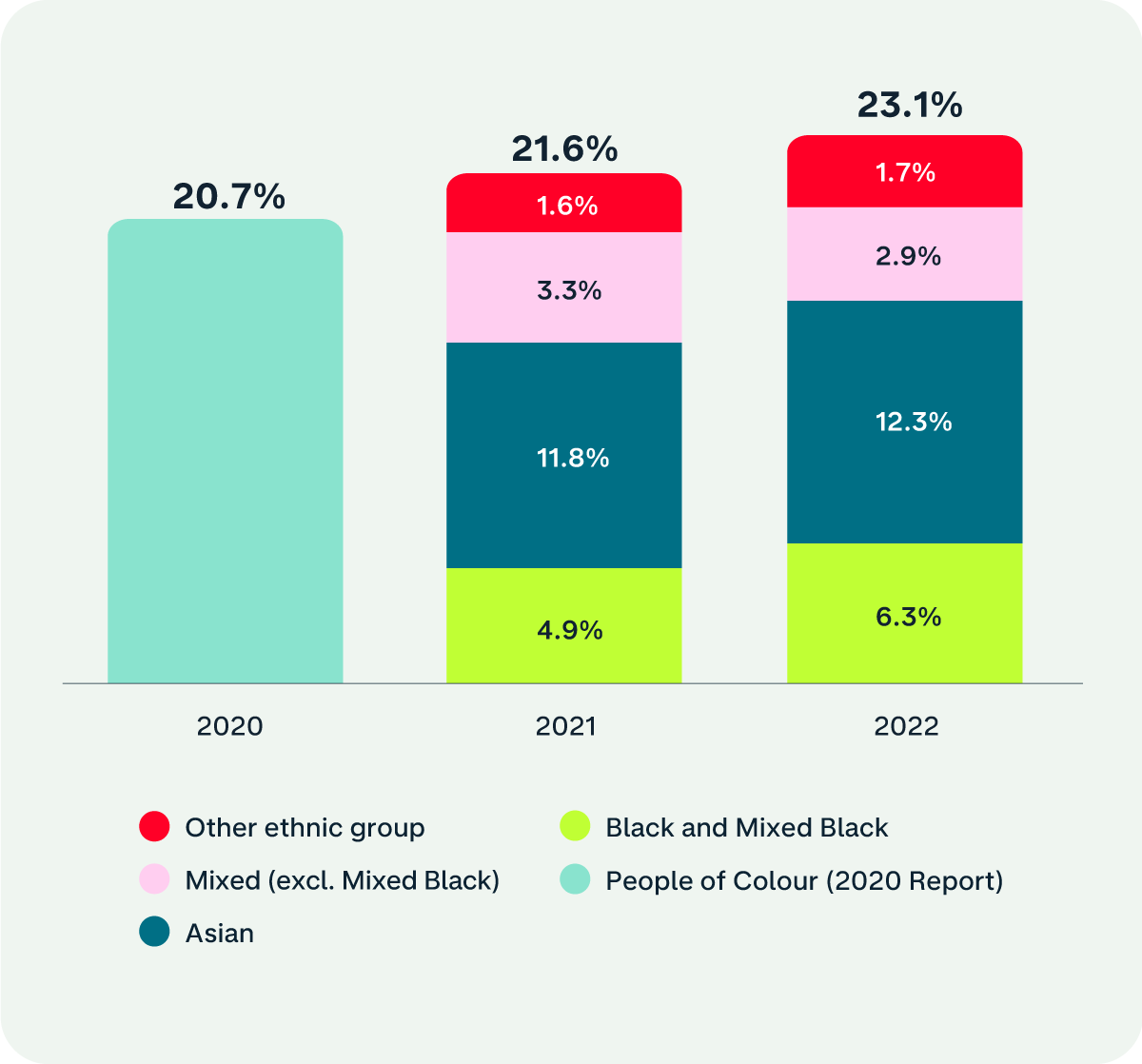
Monzo's Race Inclusion Plan looks at attraction, inclusion and progression of People of Colour with a focus on the Black and Mixed Black community. To support this plan, we have a company-wide goal to increase representation of Black and Mixed Black folk in leadership positions to be representative of the UK census.
Last year we completed our Mutual Mentoring programme where 23 mentors from the Black and Mixed Black community formed partnerships with 23 Senior Leader Mentors. Senior Leader mentors said they're now more confident to talk about race at work, while the Black and Mixed Black community mentors said they felt more confident to speak up and seek help and opportunities. 97% of all the participants said they'd recommend the programme to other staff. We’ll repeat the programme, but this time we’ll extend the opportunity to our senior managers as well as our senior leaders because of the amount of interest in the programme. This means wider Monzo can benefit from their confidence and new race inclusion skills, and more junior staff can work with people closer in career level.
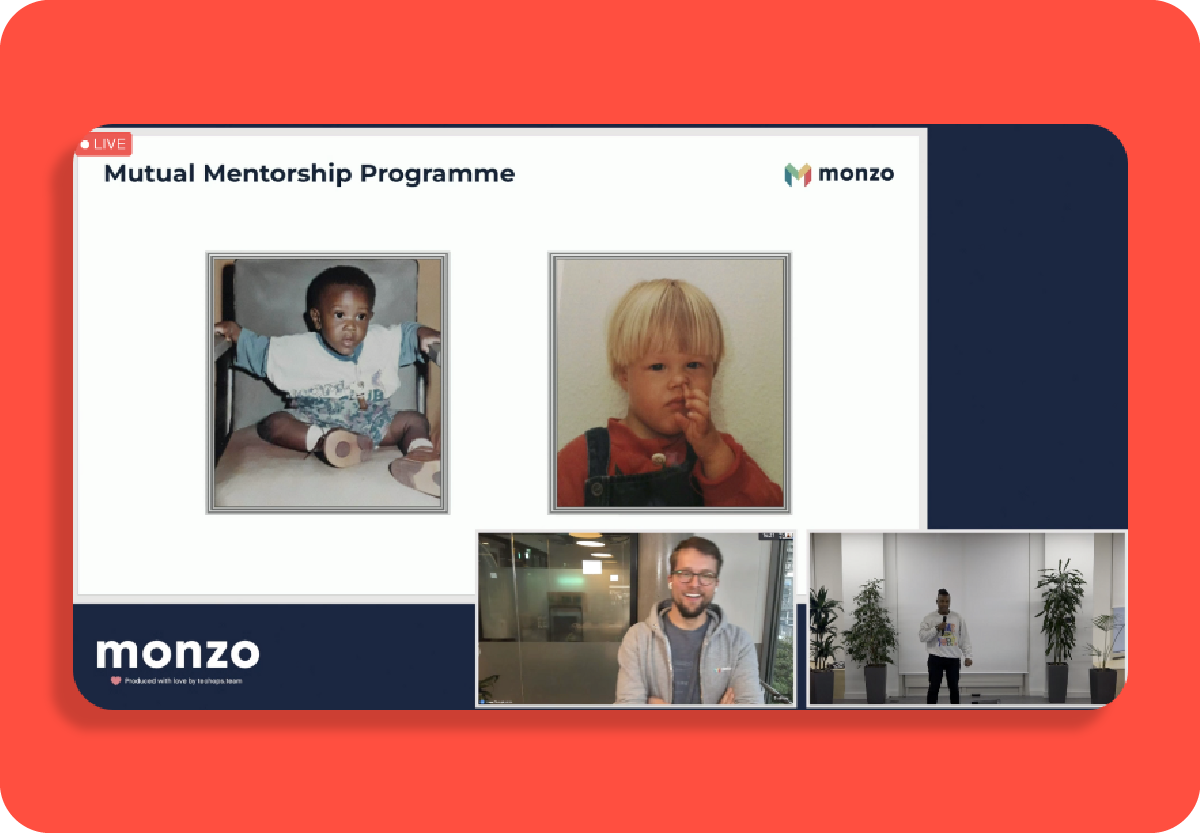
As part of Black History Month our CTO and co-founder, alongside his mutual mentoring partner, shared their experience of their partnership and what they had both gained from it. Separately, Monzo leaders have participated in Black Business Week's Allyship programme for the second year in a row. This Allyship programme has encouraged employees to get involved, meaning more than 100 people have applied to join the second round of our Mutual Mentoring programme.
These actions together have helped keep a steady drum beat of engagement in diversity and inclusion, but especially our focus on Black and Mixed Black Monzonaut representation and inclusion.
As part of the Race Inclusion plan, we’re balancing immediate impact and our longer term contribution to the tech community. So we’ve also paired 18 of our Monzo Engineers with 18 Engineers from Coding Black Females in a mentoring partnership. So far, they’ve been talking about coding projects, career advice, imposter syndrome or prepping for job interviews. We’ve invested this time to give back to the wider tech industry and to play our part in developing the careers of more Black and Mixed Black women in tech.
To support our goal we also planned our first Black Monzo strategy day with our Black and Mixed Black community group. We brought together the community and leadership for a full day to explore their mission and agreed professional and personal development objectives for this group. We now look forward to building the community into an employee resource group with allocated committee roles to achieve their mission: “We empower people within the community to grow and celebrate their authentic selves.”
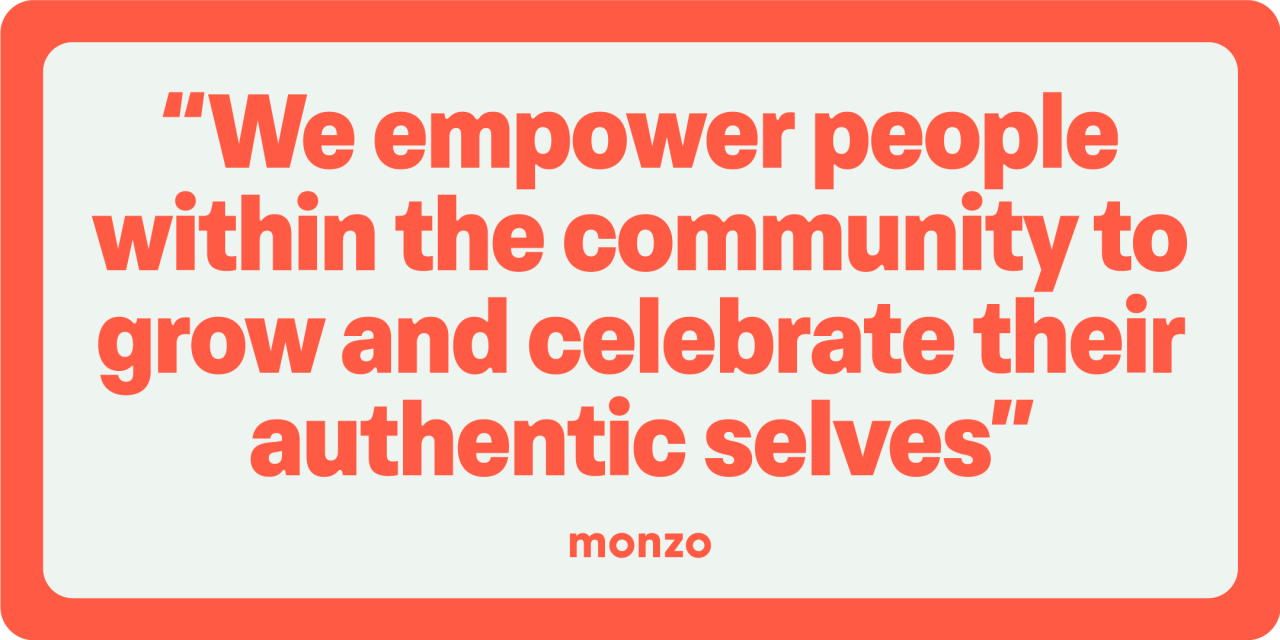
We've created more policies and benefits to support our people through important life events
In 2018 when we were still a start-up, just 23.0% of our staff were 30 or over. Today that number's 47.0%. The percentage of staff responsible for caring for a child or adult still stays around 19.0%.
As our age diversity increases, we've reviewed our policies and benefits to support the different needs of our staff.
One important change we made this year was improving our caregiver leave policy. After listening to feedback from employees and benchmarking what we offer against the industry, we’ve:
increased primary caregiver leave from 3 to 6 months full pay
increased secondary caregiver leave from 6 weeks to 3 months full pay
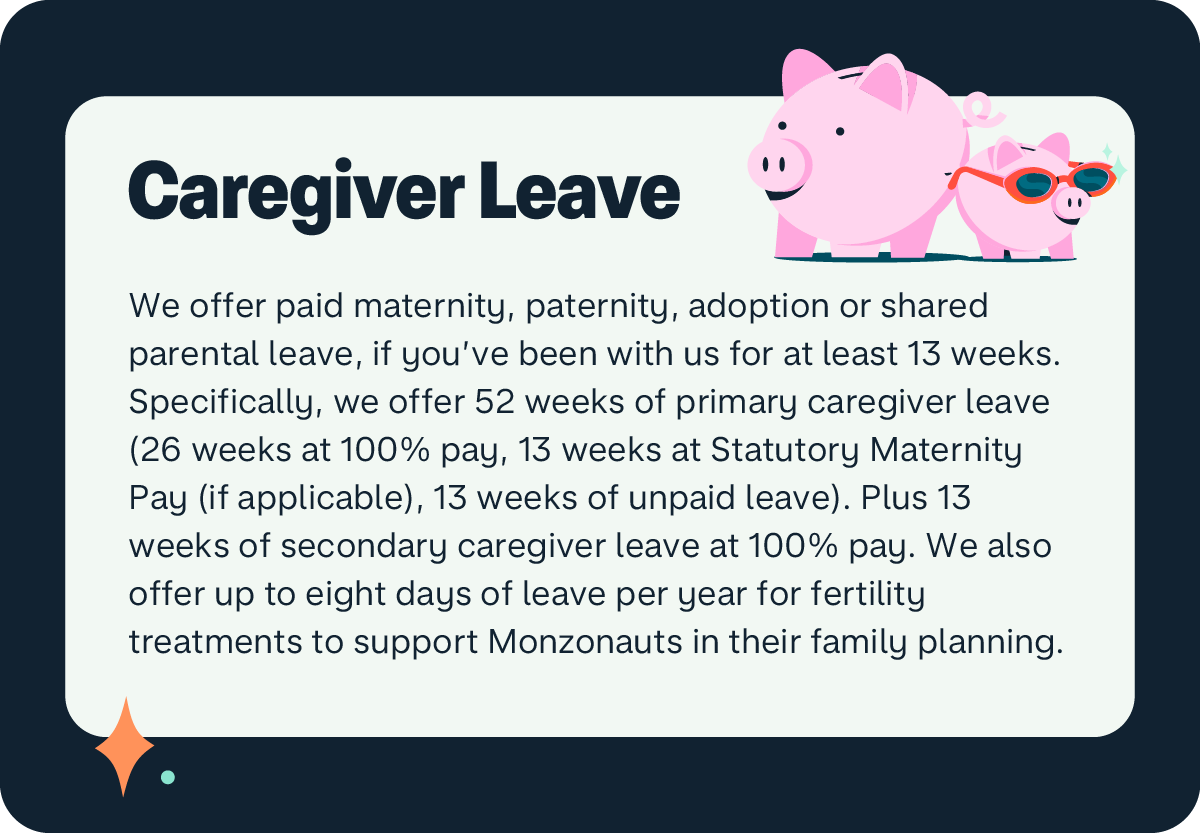
It's important to us people don’t feel that planning a family makes it harder to join Monzo, so our caregiver leave is available to anyone who’s been working here for 13 weeks or more, shorter than the more common threshold of 26 weeks. We’ll continue to make it available early in tenure so people can have flexibility, financial security and the freedom to continue building their career.
Building on our eight days of leave a year for fertility treatments, our staff now have access to fertility and family-forming support from the UK reproductive benefits provider, Fertifa. That includes access to advisors for menopause and perimenopause.
We've also now enhanced our benefits to include support for gender dysphoria which includes, for example, access to private diagnosis of gender dysphoria, counselling support and consultations with hormone specialists to support transition.
We'll continue to review our benefits to make sure we're addressing the needs of all our staff and building a strong employee value proposition.
We’re supporting our staff and continuing to foster an inclusive culture
Diversity and inclusion is important to all staff regardless of tenure. In our onboarding programme, 2 out of 3 new starters said our commitment to diversity and inclusion influenced their decision to join Monzo. And our employee net promoter score for diversity and inclusion is in the top 10% of the technology sector according to our engagement survey provider.
We want to maintain this score by making diversity and inclusion something we discuss regularly throughout the year. We celebrate and educate our staff throughout our diversity and inclusion calendar with events like Summer of Pride and Black History Month, but also through monthly diversity and inclusion leadership sharing sessions. These 60 minute recorded sessions are candid interviews with our leaders on topics like menstrual cycles, neurodiversity, bisexuality, and more.
We also use our monthly company-wide “Connect” meeting to share important information, educate people on their role in our diversity and inclusion activities, and show how they align with our wider company diversity and inclusion goals.
We partner with third parties to build awareness and acceptance to support our staff. This year, we worked with our health insurance suppliers to provide meaningful content and practical signposts through things like our Employee Assistance Programme, mental health support, cancer support, HIV support, and more.
We’re supporting the wellbeing of our staff
Around 14% of the UK are thought to be neurodivergent, but the employment rate tends to be lower (it's thought 29% of people with autism aged 16 to 64 years are employed in the UK). The percentage of people in our team who are neurodivergent has increased from 11.0% to 12.5%, while the percentage of those who have a disability has stayed around 7.2%. 11% of employed people in the UK have a disability so we’ll keep working on making our workspace and processes more accessible.
Last year, to give more focus to inclusion and accessibility for our customers, we restructured and rebranded our Vulnerable Customer team to Vulnerability, Accessibility, Inclusion & Bereavements (VAIB). As part of this, we hired an Accessibility Lead with the goal of implementing a customer accessibility and inclusion strategy across Monzo. Its aim is to address our customers' needs to make our products and services easier to use, particularly for our customers with disabilities.
We’ve trained our Customer Operations team on wellbeing and reasonable adjustments so our managers can support their teams. On top of this we’ve formed a working group with our Customer Operations employee council, to make changes to support staff who are neurodivergent or have disabilities.
This working group aims to create a more inclusive workplace for neurodivergent individuals by implementing practical changes and providing education to managers. By involving input from 100+ neurodivergent staff, the recommendations are likely to be more effective in addressing the needs of this community.
Our representation of staff who have a mental health condition has reduced from 32.7% to 29.9%. This is still higher than stated by the NHS who say 25.0% of adults experience a mental health condition at some point in their life. We believe our open, positive culture towards mental health means that people are more happy to disclose they have a mental health condition. We proactively invest in mental health services like mental health first aiders and our employee assistance programme.
The cost of living crisis impacted all of our staff in different ways. We knew our people would likely need enhanced wellbeing support, so last year we launched a cost of living support group made up of mental health first aiders and staff working in our Financial Difficulties domain.
We want to offer holistic support and so have a three workstream cost of living strategy that focuses on mental wellbeing, financial support and financial education. Our staff have already benefited from financial wellbeing webinars, an online financial education one stop shop as well as two payments, totalling £1,250 for all staff earning a salary of £40,000 or less. This payment applied to all staff and explicitly includes folks who were part time, on caregiver leave, on sabbatical or sick leave.
We’re building more community groups
Representation of staff who identify as gay, lesbian, bisexual, pansexual, asexual, queer or who prefer to self describe has stayed around 21.0%, significantly above the UK census statistic of 3.3%

Our representation of staff who identify as gay, lesbian, bisexual, pansexual, asexual, queer or who prefer to self describe has decreased slightly from 21.8% to 20.9%.
We expect this number to fluctuate over time as a normal part of people joining and leaving. And we’re still significantly above the representation in the 2021 census where 3.3% of people who shared their sexual orientation said they identified as gay or lesbian, bisexual or another sexual orientation (96.7% identified as heterosexual).
At Monzo, we collect data about trans identity separately, so we aren’t conflating it with sexual orientation.
The percentage of both non-binary and trans people hasn’t changed significantly from 2021 to 2022 and remains around 1.0%. We now have a community group for our trans folks, which helps us work together to shape our guidelines and policies with their needs in mind.
This year we extended our Pride celebrations to three months over summer. We supported Stonewall Housing with Pride events across the country during our "Summer of Pride" and hosted an event exploring the LGBTQ+ community and financial abuse with Stonewall Housing, Galop, and our own Vulnerable Customers team.
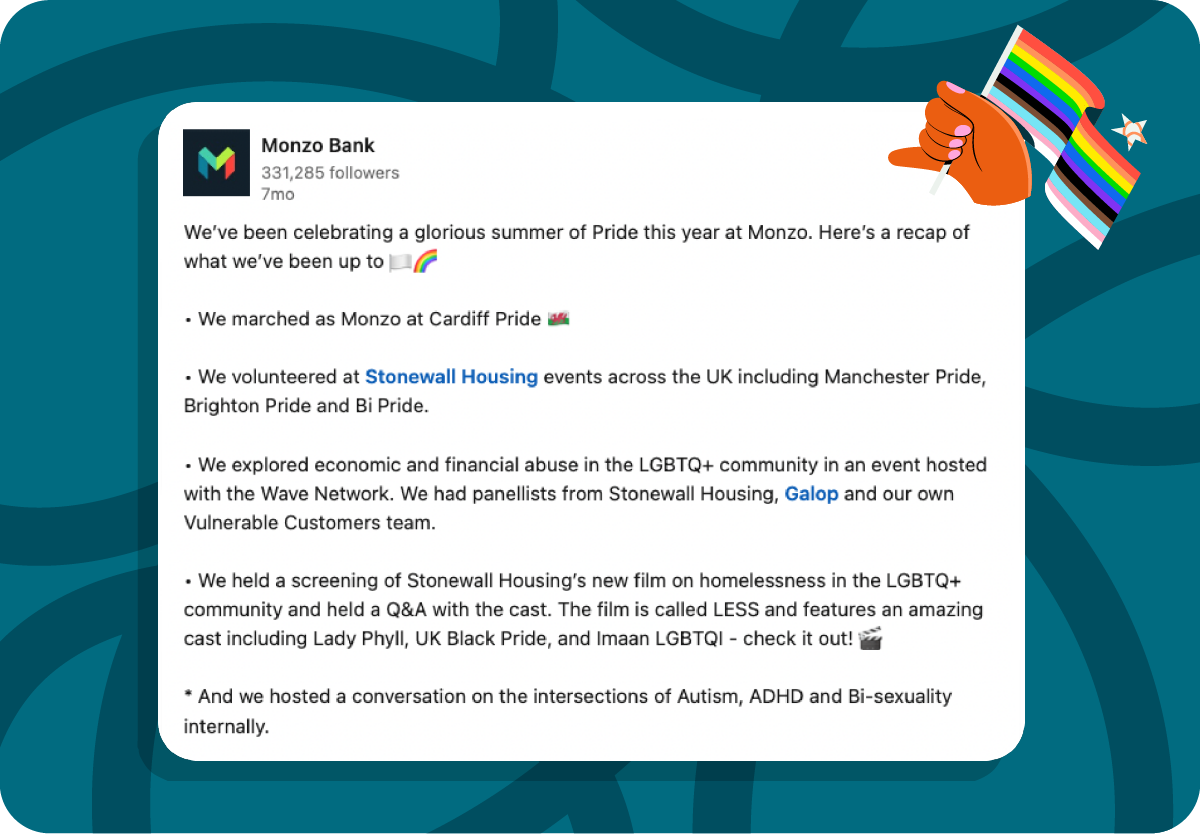
We continue to see religious diversity among our staff
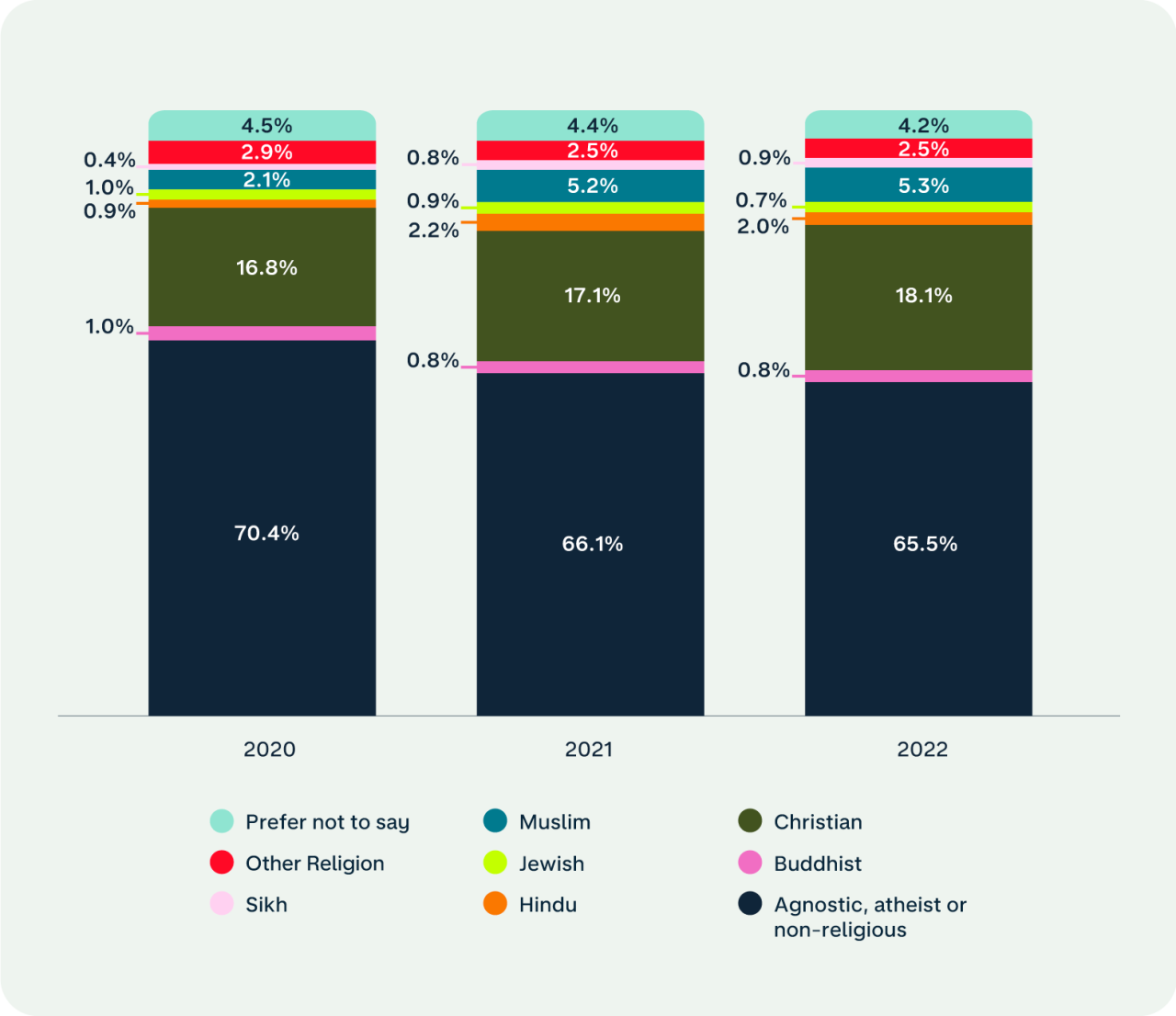
30% of our staff follow a religion and we continue to broaden the scope of shift preferences for religious celebrations to include festivals like Diwali as well as Ramadan and Christmas.
We'll continue to give people space to build communities as the needs of our staff evolve. For example we now have a community for people who are experiencing menopause or perimenopause.
We’re supporting the wider community by creating career opportunities and improving our product and services
We inspire people to have a career in fintech
The number of those who self-identify at Monzo as having a low socioeconomic background has decreased from 26.7% to 25.4%. Part of our longer term strategy to increase social mobility is to inspire people to explore a career in the fintech industry. We continue to work with school children to plant the seed early so they have the confidence and insight to embrace tech subjects as they learn.
We held a “Monzo Moonwalkers” event which is a 2 day hackathon introducing secondary school kids to software engineering and the world of banking by spending time coding with our Monzo engineers. We also partner with I Can Be, which is a children's charity that aims to widen aspirations and break down barriers to opportunity.
In our Finance team, we hired 3 external apprentices on a graduate style scheme where they rotate across different Finance teams, whilst studying for their professional accountancy qualifications. The apprentices are already providing value to their teams and enjoying the experience so we're looking to replicate the scheme in our tech team.
We're in the second year of the Cops Engineering Sponsorship programme where we give our folks in customer-facing roles access to an immersive software engineering course, with the offer to hire them as full-time junior engineers once they’ve completed it. Following the success of last year, we added more places to the programme.
We’re supporting customers' financial wellbeing
We’ve taken a series of actions to support our customers in response to the cost of living crisis, including:
showing our customers how they can use our app features to budget, save and monitor spending
signposting them to our teams, organisations and charities to support them if they are struggling with managing their money
a one stop shop “Money Worries” website to make this information accessible and digestible
We know some customers find banking difficult, so we wanted to learn more about how that can affect them. We collaborated with YouGov to commission a survey of people living with ADHD in the UK to learn more about the additional costs associated with their condition. We held listening sessions with ADHD customers to better understand their personal finance issues, such as impulse spending, bill payment management, and debt obligations, and how our app can help them.

We’re supporting inclusion charities
When we plan important diversity and inclusion events like Pride or Black History Month, we partner with relevant charities to highlight their work and support their fundraising, for example by working with Stonewall Housing through our Summer of Pride.
Last year we added the ability to donate to trusted charities directly through the Monzo app, which lets users make one-off payments or setting up recurring donations to trusted charities directly from their Monzo accounts.
The list of charities we've included is a combination of charities our customers already donate to, and ones that are relevant to our D&I priorities. For example, we've included the Sickle Cell Society because it’s important to many of the Black and Mixed Black community. We made that our spotlight charity and highlighted it in the app during Black History Month.
Our customers have donated around £300,000 through the charity donation feature since we launched in June 2022.
We’re sharing best practice with our industry
Our COO, Sujata is a member of the Women in Finance Accountable Executive Taskforce, where she collaborates with other executives to advocate for gender diversity. We also share our D&I best practice in a variety of forums, such as the European Contact Centre & Customer Service Awards, the FCA's Innovation Open Day, and the Financial Services Culture Board.
We’ll keep doing the fundamentals
By focusing on the fundamentals, we can make sure we have a strong foundation to build on and achieve our goals.
Make sure our processes are inclusive
Review our job ads to make sure they use gender neutral language.
Use diverse interview panels.
Deliver inclusive interview training to our interviewers.
Educate managers to help reduce bias when evaluating performance.
Analyse data about who’s applying for our jobs, to understand where to improve.
Analyse the performance and promotion outcomes against our diversity data.
Make our leaders accountable
Promote diversity of our most senior roles through our Board Diversity Policy.
Have specific D&I goals for the company and for each business area.
Report goal progress to our Executive Committee every month.
Challenge the diversity of candidate lists for interview or promotion.
We look forward to building on our progress, but we know there’s more to do. We’ll keep working on areas where we need to improve, like the diversity of our leadership population and closing the gender pay gap.
If you have any feedback, suggestions or questions, please share them with us. If you’d like to join us, find all the roles we’re hiring for on our careers page.